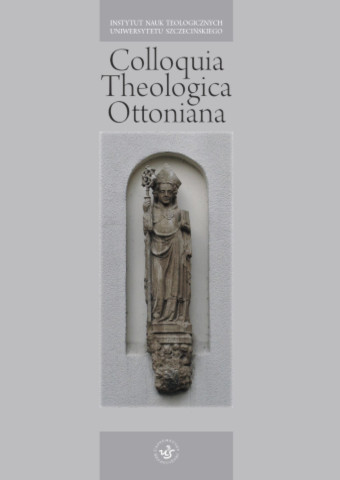
ISSN: 1731-0555
eISSN: 2353-2998
OAI
DOI: 10.18276/cto.2017.2-10




Issue archive /
2/2017
Czy wytracenie oznacza wykluczenie?
(Does dying mean exclusion?)
| Authors: |
Mirosław
Rucki
Wydział Mechaniczny, Uniwersytet Technologiczno-Humanistyczny w Radomiu |
| Keywords: | cut off exclusion excommunication Judaism Talmud Qumran |
| Data publikacji całości: | 2017 |
| Page range: | 17 (179-195) |
Abstract
The paper is discussing the translation of the Hebrew word תַרָּכ as ‘exclusion, excommunication’ in many Polish Bible translations. In the Hebrew Bible, this word appears 289 times, sometimes in the meaning of ‘to make a covenant’ (e.g. Genesis 26:28 where the animals are cut into halves and then the persons who make a covenant go between those halves), sometimes in the meaning of literal cutting (e.g. of trees), and sometimes in the meaning of extermination. In the paper, several Biblical contexts are emphasized, where the word תַרָּכ cannot be translated in other way than ‘cut off; killed.’ On the other hand, none of the Biblical contexts suggests anything different from the death. dditionally, the paper discusses the Biblical examples of the excommunication (exclusion), as well as rules of suspension of a Jew in his rights in the community found in the rabbinic Judaism and in the documents from Qumran. These exclusion rules do not contain the word תַרָּכ and do not correspond with the Biblical commandments where the kareth punishment is ordered. The conclusion is that translation of the word תַרָּכ as ‘exclusion, excommunication’ etc. does not refl ect the intention of the Biblical Author.
Download file
Article file
Bibliography
| 1. | Baumgarten J., The avoidance of the death penalty in Qumran law, w: Reworking the Bible: Apocryphal and Related Texts at Qumran, red. E.C. Chazon, D. Dimant, R.A. Clements, Leiden–Boston 2005, s. 31–38. |
| 2. | Biblia to jest całe Pismo Święte Starego i Nowego Testamentu z hebrajskiego i greckiego języka na polski pilnie i wiernie przetłómaczona, Warszawa 1986. |
| 3. | Biblia to jest Pismo Święte Starego i Nowego Testamentu, Warszawa 1975. |
| 4. | Briks P., Podręczny słownik hebrajsko-polski i aramejsko-polski Starego Testamentu, Warszawa 20003. |
| 5. | Charlesworth J.H., The Dead Sea Scrolls: Hebrew, Aramaic, and Greek texts with English Translation, Tübingen 1997. |
| 6. | Hatch E., Redpath H.A., A Concordance to the Septuagint, London–New York 1897. |
| 7. | Hempel Ch., The place of The Book of Jubilees at Qumran and beyond, w: The Dead Sea Scrolls in Their Historical Context, red. T. Lim, L.W. Hurtado, A.G. Auld, A. Jack, London–New York 2004, s. 187–196. |
| 8. | http://kodesh.mikranet.org.il (dostęp: 18.08.2016). |
| 9. | Jewish Encyclopedia, http://www.jewishencyclopedia.com/articles/12585-rashi-solomon-bar-isaac (dostęp: 14.11.2014). |
| 10. | Konkordanz zum Hebräischen Alten Testament, red. G. Lisowsky, L. Rost, Stuttgart 1993. |
| 11. | Mor Severius Moses, Rucki M., Abdalla M., Eucharystyczna obecność Chrystusa w rozumieniu liturgicznym Kościoła Antiocheńskiego, „Liturgia Sacra” 22 (2016), nr 1, s. 43–67. |
| 12. | Muchowski P., Rękopisy znad Morza Martwego, Kraków 1996. |
| 13. | Murphy C.M., Wealth in the Dead Sea Scrolls and in the Qumran Community, Leiden 2002. |
| 14. | Pismo święte Starego i Nowego Testamentu w przekładzie polskim w.o. Jakuba Wujka SJ, Kraków 1962. |
| 15. | Pismo Święte Starego i Nowego Testamentu w przekładzie z języków oryginalnych, Poznań 1994. |
| 16. | Pismo Święte Starego i Nowego Testamentu w przekładzie z języków oryginalnych ze wstępami i komentarzami, Poznań 1993. |
| 17. | Pismo Święte Starego i Nowego Testamentu. Najnowszy przekład z języków oryginalnych z komentarzem, Częstochowa 2008. |
| 18. | Popowski R., Wielki słownik grecko-polski Nowego Testamentu, Warszawa 1995. |
| 19. | Sidur szabchej geulim, Jeruzalem 1995. |
| 20. | Sprinkle P.M., Law and Life: The Interpretation of Leviticus 18:5 in Early Judaism and in Paul, Tübingen 2008. |
| 21. | Stern D., Komentarz żydowski do Nowego Testamentu, Warszawa 2004. |
| 22. | Taylor B.A., Analytical lexicon to the Septuagint, Stuttgart 2009. |
| 23. | Тора (Пятикнижие Моисеево) с классическим комментарием Сончино, Перевод: П. Гиль, З. Мешков, Иерусалим 1999. |